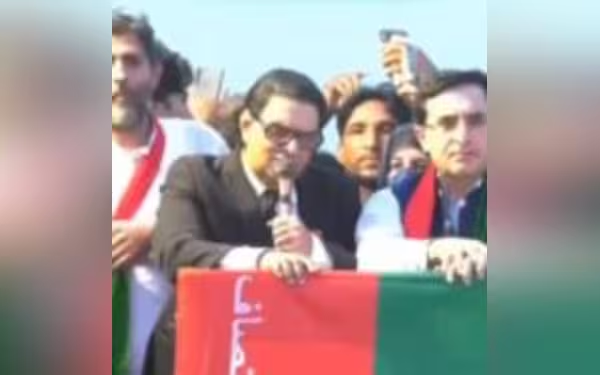Saturday, November 16, 2024 05:52 PM
Abrupt Conclusion of PTI Lahore Rally Sparks Controversy
- PTI rally in Lahore ends abruptly at 6 PM.
- Imran Khan warns of democracy's decline.
- Clashes erupt between PTI supporters and police.
 Image Credits: pakistantoday
Image Credits: pakistantodayThe PTI rally in Lahore ended abruptly, leading to clashes and warnings about democracy's future from Imran Khan.
On Saturday, the much-anticipated rally of the Pakistan Tehreek-e-Insaf (PTI) in Lahore concluded in a rather abrupt and unceremonious fashion. The event, which was expected to draw a large crowd, faced an unexpected end when the district administration decided to switch off the lights and sound system at 6 PM, the designated end time for the gathering. This action forced party leaders, including Chairman Barrister Gohar, to leave the stage prematurely, much to the dismay of the attendees.
The rally was officially permitted to run from 2 PM to 6 PM, but many PTI leaders, who were traveling from various regions, including Khyber Pakhtunkhwa (KP), were unable to reach the venue on time. As the lights went out, the PTI supporters resorted to illuminating the area with their mobile phone lights, creating a surreal scene in the darkness. The Deputy Commissioner of Lahore, Syed Musa Raza, had previously warned the organizers to adhere to the Standard Operating Procedures (SOPs) and the terms of the No Objection Certificate (NOC) issued for the rally.
Despite the abrupt ending, PTI leaders expressed gratitude towards their supporters, referring to the turnout as a "tsunami". An AI-generated video message from PTI founder and former Prime Minister Imran Khan was also played at the venue. In this message, Imran Khan thanked the supporters for their unwavering loyalty, stating, "You’ve never left me hopeless." He emphasized that the PTI's right to hold rallies is constitutional and criticized the current government for what he described as an attack on democracy.
Imran Khan drew parallels between the current political situation and the events leading up to the separation of East Pakistan in 1971, warning that if lessons are not learned from history, the country could face irreparable damage. He urged the youth to stand up against the government, which he accused of attempting to undermine democracy.
As the rally progressed, the standoff between PTI and the Punjab government came to a head. The party had initially sought permission to hold the gathering at the iconic Greater Iqbal Park, but was instead allocated the Kahna venue along the Lahore Ring Road. This change in location did not deter the supporters, who gathered in large numbers, despite the challenges faced by the party leaders in reaching the venue.
KP Chief Minister Ali Amin Gandapur and Leader of the Opposition in the National Assembly Omar Ayub were among those who struggled to arrive on time. Gandapur eventually made it to the venue but was unable to deliver his planned speech due to the early conclusion of the rally. He expressed his gratitude to the people of Lahore and KP for their support and vowed to address the crowd in a future statement.
In the aftermath of the rally, clashes erupted between PTI workers and police at the Kala Shah Kaku Motorway Interchange, leading to significant disruptions and damage to vehicles. Eyewitnesses reported that the situation escalated as frustrated PTI supporters clashed with law enforcement, blocking roads and chanting slogans.
The events of the day highlight the ongoing tensions between the PTI and the current government, as well as the challenges faced by political parties in organizing public gatherings. As the political landscape in Pakistan continues to evolve, the implications of such rallies and the responses from authorities will undoubtedly shape the future of political discourse in the country.
The Lahore rally serves as a reminder of the passionate political climate in Pakistan, where citizens are eager to express their views and support for their chosen parties. The challenges faced by PTI in organizing this event reflect broader issues within the political system, including the balance between public assembly rights and governmental authority. As the situation unfolds, it will be crucial for all stakeholders to engage in constructive dialogue to ensure that democracy remains vibrant and resilient in Pakistan.













